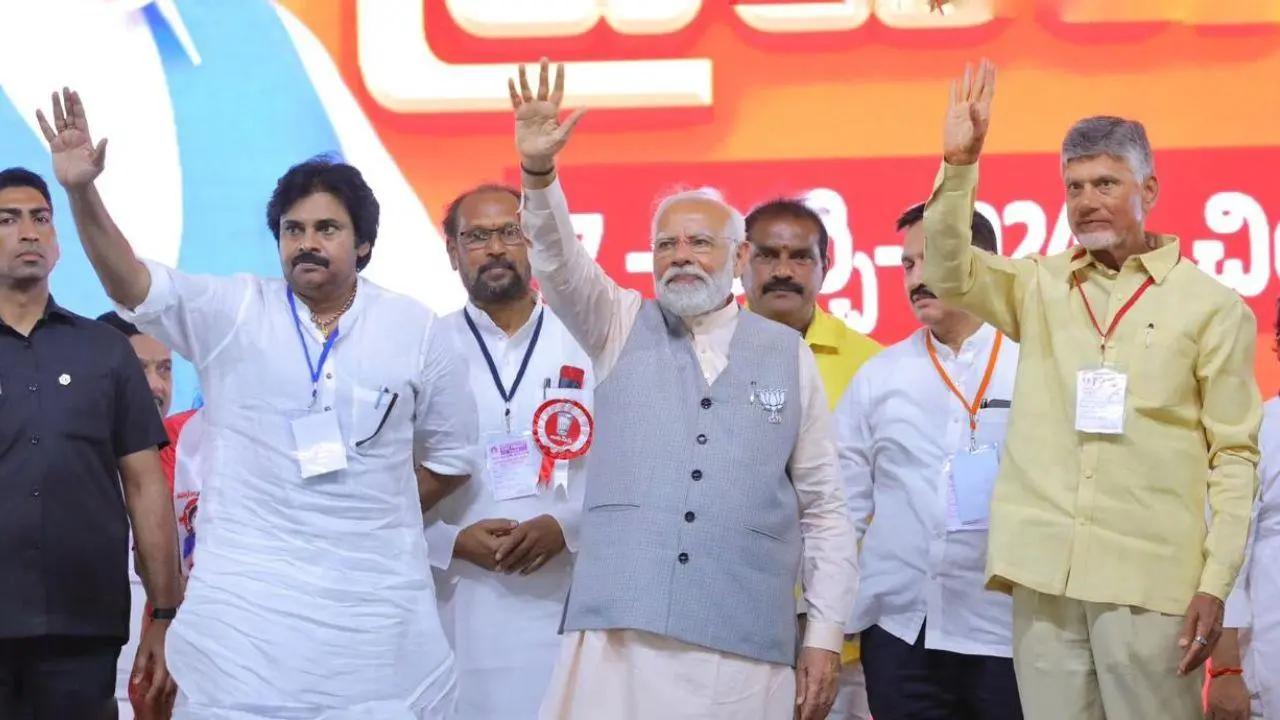The TDP-JSP-BJP alliance in the Assembly Elections 2024 presents a challenge to Congress, which is already under scrutiny for its administration & policies

Pawan Kalyan, PM Modi and N Chandrababu Naidu at NDA rally in Andhra Pradesh/ PTI
The impending Andhra Pradesh Assembly Elections in 2024 have taken an interesting turn with the creation of alliances and political plans. Two major parties, N Chandrababu Naidu's Telugu Desam Party (TDP) and Pawan Kalyan's Jana Sena Party (JSP), have allied with the Bharatiya Janata Party (BJP), transforming the state's political landscape.
ADVERTISEMENT
The TDP, JSP, and BJP coalition seeks to strengthen their support base and show a united front against the government YSR Congress Party, led by Chief Minister Jagan Mohan Reddy in Assembly Elections 2024. With Naidu's expertise and Kalyan's popularity among young people, the alliance intends to pose a significant threat to the current government.
The choice to collaborate with the BJP has sparked both anticipation and outrage. While some see it as a deliberate effort to challenge the YSRCP's growing dominance, others dismiss it as an opportunistic partnership motivated by political expediency. Nonetheless, the alliance partners have expressed confidence in their capacity to address the state's concerns and effect constructive change.
One of the most pressing questions about the partnership is its possible influence on the Congress party led by Jagan Mohan Reddy. The TDP-JSP-BJP alliance presents a huge challenge to Congress, which is already under scrutiny for its administration and policies. The alliance's coordinated efforts to mobilise voters and capitalise on anti-incumbency emotions may erode support for Congress in key districts.
Furthermore, the BJP's participation in the alliance alters the electoral situation in Andhra Pradesh. While the party has traditionally had little clout in the state, its partnership with the TDP and JSP could improve its chances and extend its appeal to voters. The BJP's emphasis on national concerns and development objectives may appeal to certain segments of the voters, thereby shifting the political narrative in the state.
However, the success of the TDP-JSP-BJP coalition is dependent on a variety of factors, including efficient campaign strategy, candidate selection, and voter contact initiatives. Furthermore, the alliance partners must navigate the difficulties of coalition politics and manage competing interests to present a unified programme to the electorate.
As the Andhra Pradesh Assembly Elections 2024 approach, political experts and watchers are keenly watching changes and dynamics in the state's political environment.
 Subscribe today by clicking the link and stay updated with the latest news!" Click here!
Subscribe today by clicking the link and stay updated with the latest news!" Click here!







